
12,000 voices bring improvements in third offer Coverage: pages 4, 5, 7, 17, 18, 19, 20


The State School Teachers’ Union of W.A. Volume 53.3 May 2024 sstuwa.org.au
They heard us


Correspondence:
The Editor, PO Box 212, West Perth WA 6872 editor@sstuwa.org.au | Ph: 9210 6000
Member Assist: Ph: 9210 6060 memberassist@sstuwa.org.au
Print post publication 100004470 | $4.95 ABN: 544 780 946 35
Authorised by Mary Franklyn, General Secretary, The State School Teachers’ Union of W.A., 1 West Street, West Perth WA. Printed by Vanguard Press, 26 John Street, Northbridge WA. May 2024.
Cover: The stop work action on 23 April brought a number of improvements in the Department of Education’s third offer for a replacement General Agreement (Schools). Coverage: pages 4, 5, 7, 17, 18, 19 and 20. Photo credit: Minh Lam.
To access the digital copy of Western Teacher, visit: sstuwa.org.au/westernteacher
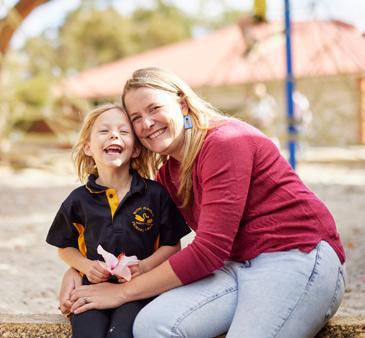



Western Teacher is the official publication of The State School Teachers’ Union of W.A. Advertisements in Western Teacher are the responsibility of advertisers. While Western Teacher makes reasonable efforts to ensure that no misleading claims are made by advertisers, responsibility is not accepted by The State School Teachers’ Union of W.A. for statements made or the failure of any product or service to give satisfaction. Inclusion of a product or service should not be construed as an endorsement or recommendation by The State School Teachers’ Union of W.A.
In this edition
Connect with us: @sstuwa Features Full funding of public schools must be delivered 8 WA school funding 9 Transitioning to full registration 12 Facing the facts about class sizes 13 Empowering educators in the age of AI 14 New survey reveals record level of school violence 16 Across the state poster 17 Making your voice heard poster 18 National Reconciliation Week 2024......21 Having a good school culture and approach to gender 22 Positive impacts of increased public schools funding 24 National education and union news.................................................................. 26 Regulars From the President 4 From the Senior Vice President 7 From the Vice President 10 Education and Training 28 Member Benefits ................................................... 30 Classifieds 32 Noticeboard 34 2024 Western Teacher deadlines Edition Deadline February 4 December March 5 February May 8 April June 20 May August 8 July September 12 August October 16 September November 7 October December 11 November Dates are subject to change Volume 53.3 May 2024 Acknowledgement of Country: We wish to acknowledge the traditional custodians of In this edition
Together WACSSO is the peak body for Parents and Citizens (P&C) groups across Western Australian public schools Our vision is for WA schools to provide world-leading education to every student Representing the parent voice in public education, for over a century we’ve worked passionately with P&Cs to improve the education system, all the while never losing sight of a simple principle: that we are stronger together. To find out more about WA’s incredible network of P&Cs and how WACSSO supports them, visit www wacsso wa edu au
Stronger
Potential schools agreement delivers significant benefits
By Matt Jarman President
Your actions on 23 April were critically important and resulted in a far better offer presented from the employer than had previously been on the table in negotiations for the 2023 General Agreement.
Now you have an equally important role to play by casting your vote for or against the agreement in principle that is being presented to you.
Perhaps most significantly of all, workload reduction measures have been addressed in this third offer. The importance of these workload related conditions cannot be overstated. Survey after survey our members have told us that overwhelming red tape was reducing their time for actual teaching.
Crucial among these measures in steering the Executive to recommend acceptance were:
• A positive effort to manage class size issues including:
o Improved classroom support and small group tuition to 13,000 students in 350 schools.
o Clear instructions to school leaders that they will provide additional support to teachers asked to manage oversize classes and

that they will take into account the number and proportion of students on individual plans when providing that support.
• An additional 64 FTEs to be engaged as complex behaviour support coordinators across 192 schools.
• A direction to apply student documented plans only in specific circumstances.
• Professional learning will include employee choice, as well as required online professional learning to be completed for the purposes of legislative and system requirements only.
• A new Workload Ministerial Taskforce which will include the SSTUWA and which will report directly to the Minister for Education.
• Long Service Leave: Access to pro rata long service leave during the first accrual period after completion of seven years continuous services.
All of these improvements and more were made in offer three – directly influenced by the stop work action. These are your wins.
The voter information package, found at sstuwa.org.au/GA2023 includes symbols

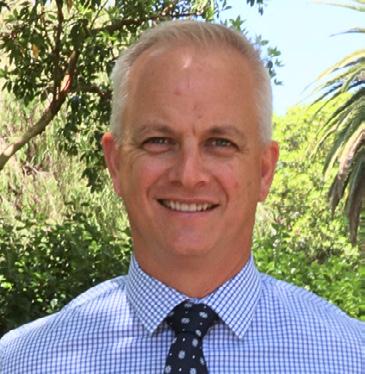
highlighting what was received in the third offer and what is directly linked to a Facing the Facts recommendation.
After years of being disadvantaged, teachers who want to make a long-term contribution in rural and regional areas will be able to do so with the safety of being able to revert back to their substantive positions.
There will also be proper support and security for those seeking to work as a regional school leader. Again, they will retain their substantive positions for three years.
In terms of salary the final offer is five per cent, four per cent, three per cent with no trade-offs of any conditions, with additional salary classification increments for senior teachers and level 3 leaders. There have also been positive changes made to levels for principals.
This offer delivers salary increases of 12 per cent over three years. Each year delivers increases above the predicted rate of inflation, by one per cent, one per cent and 0.5 per cent respectively.
On salaries alone members will be around $10,000 to $20,000 better off by the end of the agreement.
For many this increase will be improved by a switch to district allowances which in some locations offer almost $6,000 per annum.
Graduate teachers would be some of the best paid in Australia. Senior teachers would also see significant salary improvements, as would school leaders.
Overall, there are significant gains for every teacher, in every location. I urge you to read all the information being provided to you in print and online.
Members are the crucial voice in all of these deliberations and it will be your vote that counts as the process moves forward.
4 Western Teacher May 2024 From the President

Proposed salaries
Teachers, senior teachers, level 3 classroom teachers, school administrators
5 Western Teacher May 2024 From the President
Increment/ Classification Current salary (payable from 6 Dec 2022) 2023 rate 5% per annum increase 2024 rate 4% per annum increase 2025 rate 3% per annum increase Dollar increase: (current to 2025 salary)
$78,397 $82,317 $85,610 $88,178 $9,781 2.2 $85,020 $89,271 $92,842 $95,627 $10,607 2.3 $92,080 $96,684 $100,551 $103,568 $11,488 2.4 $95,287 $100,051 $104,053 $107,175 $11,888 2.5 $98,621 $103,552 $107,694 $110,925 $12,304 2.6 $102,084 $107,188 $111,476 $114,820 $12,736 2.7 $105,683 $110,967 $115,406 $118,868 $13,185 2.8 $109,482 $114,956 $119,554 $123,141 $13,659 2.9 $113,568 $119,246 $124,016 $127,737 $14,169 ST1 $117,854 $123,747 $128,697 $132,557 $14,704 ST2 NA $125,247 $130,257 $134,165 $8,918 (2023-2025) L3CT 3.1 $122,308 $128,423 $133,560 $137,567 $15,259 L3CT 3.2 $125,850 $132,143 $137,428 $141,551 $15,701 L3CT 3.3^ NA $137,301 $142,793 $147,077 $9,776 (2023-2025) Admin 3.1 $125,850 $132,143 $137,428 $141,551 $15,701 Admin 3.2 $130,763 $137,301 $142,793 $147,077 $16,314 Admin 3.3 $134,192 $140,902 $146,538 $150,934 $16,742 3.4 $137,715 $144,601 $150,385 $154,896 $17,181 4.1 $141,644 $148,726 $154,675 $159,316 $17,671 4.2 $145,236 $152,498 $158,598 $163,356 $18,120 4.3 $148,833 $156,275 $162,526 $167,401 $18,568 4.4 $150,644 $158,176 $164,503 $169,438 $18,794 5.1 $153,963 $161,661 $168,128 $173,171 $19,208 5.1A* $155,717 $163,503 $170,043 $175,144 $19,427 5.2 $158,889 $166,833 $173,507 $178,712 $19,823 5.3 $163,826 $172,017 $178,898 $184,265 $20,439 5.4 $165,636 $173,918 $180,875 $186,301 $20,665 6.1 $172,065 $180,668 $187,895 $193,532 $21,467
$177,479 $186,353 $193,807 $199,621 $22,142 6.3 $181,928 $191,024 $198,665 $204,625 $22,697 6.4 $183,739 $192,926 $200,643 $206,662 $22,923 ^level 3.3 rates for use in the level 3.3 classroom teacher trial
2.1
6.2
(select tables, annual rates) Have your say on your EBA Find all the Agreement in Principle 2023 (Schools) materials, including full salary tables, at sstuwa.org.au/GA2023


Eligibility criteria and conditions apply. Teachers Federation Health Ltd ABN 86 097 030 414 trading as Teachers Health. A Registered Private Health Insurer. THF-SSTUWA-04/24
Nancy, Teachers Health member
Workload wins, class size action
By Natalie Blewitt Senior Vice President

On 23 April, SSTUWA members stood together to bring home to the employer the seriousness of members in their pursuit of better working conditions and an improved salary.
Whether you joined us at Gloucester Park, marched across the Matagarup Bridge, attended a regional event, designed and made a poster, supported your colleagues/staff to link in with an event or met wherever you could to watch the livestream event – thank you!
Collectively, we attracted over 12,000 members across Western Australia, and we were joined by many community and public sector union supporters. The message to the state government that teachers and school leaders are overworked, underfunded and over it could not have been louder.
Your efforts on 23 April prompted significant improvements in the department’s third offer, including major steps forward in workload and management of class sizes, that offer strong foundations for future gains.
Some of the items worth noting that were secured in the third offer include:
Senior Teacher
Creation of new classification for Senior Teacher Level 2, for Senior Teachers performing two negotiated duties as listed in the Agreement. (Senior Teacher 1 currently states to perform one negotiated responsibility.)
Class sizes
Agreed changes to how class sizes will be configured have been achieved. The notional size of the class, the number of students known to need a documented plan and the need for additional support to be provided are included in these changes.
Documented plans
Significant changes built into the General Agreement clearly describing which students should, and do not, require a documented plan. Progress maps to now be recognised as documented plans.
Long service leave
An amendment to the Teachers (Public Sector Primary and Secondary Education) Award 1993 (Award) permitting access to pro rata long service leave during the first accrual period after completion of seven years continuous service.
Small group tuition
A targeted initiative (TI) to address classroom support and workload reduction. The TI will provide small group tuition to 13,000 students in the 350 schools. Schools will receive between 0.1 FTE and 1.0 FTE to appoint additional teacher FTE, commencing in 2025.
Complex behaviour management
Additional 64 FTE will be shared across 192 schools for the life of the Agreement as complex behaviour support coordinators within schools, alongside the development of a framework to support schools. The department will consult with the parties to the Agreement on the development and implementation of this program.
Professional learning
Conditions related to choice and consultation will be built into the new General Agreement. Categories clearly describing professional learning and its purpose related to school and classroom needs also included.
Extended aircon subsidy
From 1 January 2024, the air conditioning

subsidy will commence 15 days earlier and finish 15 days later than the applicable dates identified in the Government Regional Officers’ Housing – Government Housing Air Conditioning Policy. The subsidy will apply for three calendar years.
Workload Ministerial Taskforce
The department will establish with parties to the Agreement a Workload Ministerial Taskforce that will report to the Minister for Education. The taskforce will operate for the life of the Agreement.
The Taskforce will focus on the priority areas of classroom support, complex behaviour management, professional learning, compliance and individual student documented plans. The purpose will be to identify opportunities and evaluate initiatives which support the management of school leader and teacher workloads.
Right of return for school leaders
Right of return for principals who are appointed to system level positions, at level, for a period not exceeding 12 school terms.
The points above are some of the new and/or improved items presented in the third offer. To view the complete Agreement in Principle, head to sstuwa.org.au/GA2023.
Please take the time to read and understand the contents of the third offer, join a Zoom video meeting or attend a worksite briefing.
7 Western Teacher May 2024 From the Senior Vice President
Full funding of public schools must be delivered

The Australian Education Union (AEU) has urged the nation’s education ministers to make real progress on public school funding, with new research revealing the urgent need for the additional investment to lift results and combat debilitating teacher shortages and declining student and teacher wellbeing.
A new AEU survey of 1,255 principals and teachers in WA in March and April this year shows:
• Teacher shortages affected 70 per cent of public schools in the last year and 83 per cent of principals said it had become harder to fill vacant positions. Two-thirds of teachers taught merged classes due to the shortages.
• Only four per cent of WA teachers said their school is well-resourced.
• Over 70 per cent of teachers reported a decline or significant decline in student wellbeing and engagement in the last 18 months. Nine out of 10 teachers reported a decline or significant decline in teacher wellbeing and morale over the same period.
• Only 13 per cent of teachers think the level of school counsellor support at their school is adequate and 18 per cent said there was none.
• Less than one in five WA teachers are committed to staying until retirement, raising the possibility that acute teacher shortages will worsen without real action by governments.
AEU Federal President Correna Haythorpe said only 1.3 per cent of public schools
are fully funded and none of them are in Western Australia. WA public schools would have an additional $549 million to spend this year if they were fully funded.
“The challenges are too great and the cost of inaction too high for governments to continue to fail on public school funding,” she said.
“We have seen plenty of talk but not enough action. This is despite the national inquiry instigated by education ministers, warning in December, that there is an ‘urgent and critical’ need to fully fund public schools and it is a prerequisite for learning and wellbeing improvement.
“The challenges in schools have never been greater - more diversity and complexity in student need, increasing wellbeing and mental health issues and acute shortages of teachers.
“Our principals, teachers and support staff are doing an extraordinary job, but they are being asked to do too much with too little and there just aren’t enough of them.
“Fully funding public schools is the only way to ensure every child gets the support they need to succeed, and we can recruit and retain sufficient numbers of teachers.”
In the AEU survey, over 90 per cent of WA teachers said additional support for students with disability or behavioural issues would be very helpful for them in improving student outcomes. Other top priorities were more time for lesson planning, assessment and reporting within their paid hours and smaller class sizes.
Ms Haythorpe said the statement of intent between WA and the Albanese Government, announced in January, needed to be the first draft and not the final deal because it would still leave public schools significantly underfunded.
“Fully funded means reaching 100 per cent of the Schooling Resource Standard (SRS) which is the minimum level of funding governments agreed a decade ago was required to meet the needs of all students,” she said.
“WA public schools are only funded at 91 per cent of the SRS now.
“The WA statement of intent ignores the fact that WA’s SRS funding share is artificially inflated by four per cent via the inclusion of non-school spending such as capital depreciation, pre-school and transport costs.
“That ‘additional allowance’ is denying public schools $244 million this year and if it is not removed would deny public schools $1.3 billion over five years.
“Public schools need full not fake funding.
“Principals, teachers, parents, unions and community groups all believe the Albanese Government needs to lift its share of the SRS from 20 to 25 per cent. WA must get rid of this four per cent rort and fund a true 75 per cent of the SRS.
“Short-changing our schools is shortchanging our students and it is time for it to end.”
Issues 8 Western Teacher May 2024
WA school funding

Public schools in Western Australia educate proportionally more than twice the number of students from low socio-educational advantage backgrounds, compared to private schools and 2.7 times the number of Aboriginal and Torres Strait Islander students.
Western Australia student demographics by school sector 2023

Public school underfunding in Western Australia
Despite the clear and increasing need of public school students in Western Australia, under the statement of intent signed by the WA and Federal governments in January 2024 they will continue to be underfunded by the Commonwealth and state governments:
• Public schools will be underfunded by $1.78 billion over the five-year period 2024-2028.
“That has been always considered as part of the funding agreement. Every other state does it. That four per cent goes to ensuring that we have a quality education.”1
• That is not the case, as these costs were never intended to be counted as part of recurrent school funding and were explicitly excluded from the SRS when it was devised.
• As shown in Commonwealth Department of Education internal briefings2, this clause was introduced in 2018 during bilateral funding agreement negotiations between the then Commonwealth Treasurer Josh Frydenberg and state and territory treasurers.
• This alone will remove $244.0 million of funding out of classrooms in 2024, rising every year to $283.8 million in 2028 and accounts for a total of $1.32 billion in underfunding over the five years 2024-2028.
As shown above, and contrary to claims from the Cook Government, the statement of intent signed between the WA government and the Commonwealth will leave public schools in WA underfunded by at least $1.78 billion in total over the fiveyear period 2024-2028.
The continuation of the four per cent “additional allowance” will deprive public school students of at least $280 million per year ongoing after 2028. Private school overfunding in Western Australia
• Every public school student will be underfunded by $1,864 in 2024, and will still be underfunded by $937 each in 2028.
• $1.32 billion of the underfunding of public schools in Western Australia over the five-year period 2024-2028 comes from the state government’s use of the “four per cent additional allowance” for school transport, capital depreciation, kindergarten expenditure and regulatory bodies – costs never intended to be covered from the Schooling Resource Standard (SRS).
• In January 2024 WA Education Minister Dr Tony Buti claimed:
Under current arrangements, over the next five years private schools in the state will continue to be overfunded by the Commonwealth and WA governments by:
• A total of $201.7 million from 2024 to 2028.
On a per student basis every private school student in Western Australia will receive $425 above their full SRS in combined state and Commonwealth funding in 2024 and a total of $1,328 over 100 per cent of the SRS over the five-year period 2024-2028.
Buti, Tony. 31 January 2024. Press Conference. Hamersley, WA.
2 Senate Estimates Briefs. April 2023. FOI Disclosure Log, p.187. https://www.education. gov.au/about-department/corporate-reporting/freedom-information-foi/foidisclosure-log
Issues 9 Western Teacher May 2024
2024 2025 2026 2027 2028 Total public school SRS % 91.00% 93.5% 96.00% 96.00% 96.00% Per student public school underfunding $1,864 $1,389 $880 $909 $937 Total public school underfunding $549,032,853 $412,201,355 $262,955,732 $273,418,385 $283,774,131
WA private schools overfunding 2024 2025 2026 2027 2028 Total private schools SRS % 103.0% 102.4% 101.8% 101.2% 100.6% Overfunding per student $425 $350 $271 $186 $96 Total private school overfunding $64,515,722 $53,203,895 $41,103,853 $28,369,283 $14,579,619
Standing in solidarity to achieve reconciliation
By Sharmila Nagar Vice President
The SSTUWA continues to remain steadfast in its efforts to support Aboriginal and Torres Strait Islander peoples in their fight for justice and equality.
As a union, we will continue to work with our Aboriginal and Torres Strait Islander Committee, UnionsWA and the Australian Education Union (AEU) to stand in solidarity with Aboriginal and Torres Strait Islander communities.
At the recent AEU Federal Conference, key reports from union officials, Yalukit Yulendj and invited guests discussed the issue of “where to next” after the referendum.
The power and resilience of Aboriginal and Torres Strait Islander leaders in the union movement was recognised as a significant contributing factor to 67 per cent of union members supporting the Yes vote.
It is also important to not forget the Uluru Statement from the Heart in its entiretyVoice, Treaty and Truth.
The AEU conference statement highlighted the following:
Our Priorities – The Uluru Statement from the Heart – What Next
In 2017, the AEU accepted the invitation issued to all Australians by the Uluru Statement from the Heart. We accepted the generous offer from Aboriginal Peoples and Torres Strait Islander Peoples and their communities to walk together to build a strong foundation for a safer, respectful, more compassionate Australia, in which we can all thrive.
The referendum campaign was hard
fought and traumatic, with people from all walks of life coming together with hope and a shared vision for the future. Now is the time to strengthen our efforts and commitment to justice for Aboriginal Peoples and Torres Strait Islander Peoples and their communities.
The referendum result, and the journey to this point, reminds us that change can be a long and challenging process. As teachers, principals and education support personnel, we have an intrinsic responsibility to build the skills, knowledge and understanding of our students, to help shape the world that our students live in.
This is transformative, and public education is at the heart of our society and indeed democracy.
Education provides a path to knowledge, opportunity, and social progress for all. It is a powerful tool that can challenge biases, behaviours, dismantle stereotypes, micro-aggressions, racism and create inclusive environments.
As we walk together for a better future, we must never take a step backwards or look away. We will ensure an environment


in public education where open, honest and truthful discussions about our history can take place.
We have an obligation to develop critical thinking, empathy, and a sense of responsibility amongst all students.
When we equip young people with the knowledge needed to truly understand the past, we empower them to be active, informed citizens who can shape a more just and compassionate future.
Our work to achieve equity and prosperity for Aboriginal Peoples and Torres Strait Islander Peoples and their communities is not finished.
Today, and every day, we recommit ourselves to walking together towards a better future for all members, staff, students, families and communities.
A key discussion point with our Aboriginal and Torres Strait Islander Committee has been around cultural responsiveness in our schools.
The Department of Education’s Aboriginal Cultural Standard Framework (which was last produced under former Minister
10 Western Teacher May 2024 From the Vice President
for Education Peter Collier and previous Director General Sharon O’Neill) is in much need of an update.
The biggest concern from the committee is the need to ensure the framework is prioritised as part of a school’s plan and to support schools to action the framework.
Part of the framework’s implementation would be to engage in local communities and support the creation of partnerships with the community.
Schools also need to be properly funded via targeted initiatives to allow meaningful and effective cultural training to cater for individual school contexts.
And let’s not forget that teachers in regional and remote areas need to be provided with additional professional learning and community engagements in order to best support Aboriginal students in these areas.
Within the SSTUWA, our Communications Team actively sources articles regarding Aboriginal and Torres Strait Islander education matters to ensure Western Teacher contains such content.

All our senior officers and organisers are aware of the local country they are on when on itinerary, as was discussed in 2022 and 2023, and use this in their Acknowledgement of Country.
We recently were invited to participate in the Reconciliation Industry Network Group - Reconciliation in Education with other education associations and universities. In 2024 the Aboriginal and Torres Strait Islander Committee is moving forward and open for only Aboriginal and Torres Strait Islander members. We are also hoping to have an Aboriginal and Torres Strait Islander officer in the union soon.
We also have commissioned union shirts with our First Nations artwork and the SSTUWA logo has been refreshed and reflects our connections to Aboriginal and Torres Strait Islander communities.
Now More than Ever is the theme for this year’s National Reconciliation Week (NRW), which runs 27 May to 3 June.
As said by Reconciliation Australia, Now More than Ever the work continues and the SSTUWA will participate in reconciliation activities during NRW. For
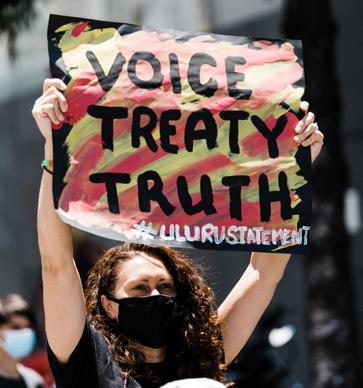
more information on NRW see page 21 of this issue of Western Teacher
Regardless of the outcome of last year’s Voice to Parliament referendum, as a society and more importantly as educators, we must not lose sight of the fight for justice and support Aboriginal and Torres Strait Islander people in our workplaces and communities on the unfinished business of reconciliation.


11 Western Teacher May 2024 From the Vice President
Have your say on your EBA Member vote on the Schools Agreement in Principle 2023 Be informed Review the AIP materials at sstuwa.org.au/GA2023 Have your say From 17 June - 4 July, click the vote now button at sstuwa.org.au/GA2023 Voting timeline Voting opens: 4pm Monday 17 June 2024 Voting closes: 4pm Thursday 4 July 2024

Transitioning to full registration
By Chloe Hosking Growth Team coordinator
As a beginning teacher, you are given three years (less 28 days) to transition from provisional to full registration with the Teachers’ Registration Board of Western Australia (TRBWA).
To make this transition, you will need to provide evidence to your appropriate person – normally your principal or their delegate – that you are operating at the Proficient career stage against the Australian Professional Standards for Teachers standards.
There’s no rush to get this process started straight away. However, it’s a good idea to have an understanding of what will be involved.
Your first step is to download the Guide to Evidencing the Professional Standards at the Proficient Level document from the TRBWA website. This has some great examples of evidence that might give you some ideas.
Even if you are not actively preparing to transition to full registration at this stage, your future self will thank you for collecting evidence early. Take a photo of a great assessment you wrote, a piece of feedback you’ve written or screenshot the record of a phone call you’ve made.
You can also keep track of your professional learning by logging into the Department of Education’s (DoE) Human Resources Management Information System, clicking on your professional profile, and adding an entry to the external professional training log.
DoE professional learning automatically appears in a separate log above. SSTUWA training and professional development is listed in your member info hub on our website and app.
And of course, there’s more to the work you do than professional learning. Perhaps you’ve successfully introduced
a new method of teaching based on self-reflection or managed a difficult situation with a student and their family.
Have you taken part in a committee or run an after-school activity? Keep a record of these successes and add to them over time.
Whether it’s a note in your phone, a page at the back of your weekly planner, or a Word document on your desktop, you’ll be very grateful to your past self for this record when it comes time to use it!
It’s really important to arrange a meeting with your principal (or their nominated delegate) early in the process so you are both aware of and agree on expectations.
Your principal or their delegate will need to sign off on your application to transition to full registration, so make sure you understand what evidence they will need to see to do so.
Additionally, if you are in your first 30 months of teaching, you can request to join the In-Class Coaching Program.
You will be allocated a coach who will provide you with individualised supportcompletely free of charge.
Anything you speak about with your coach remains entirely confidential. You will be supported to develop and refine your classroom practice, participate in lesson observations and reflection, implement learning from the graduate teacher modules in practice and work towards the proficient career stage.
To apply, search “In-Class Coaching” on Ikon.
Finally, and most importantly, make sure you submit your application at least 28 days before your provisional registration expires to allow time for processing.


New educators 12 Western Teacher May 2024
Facing the Facts about class sizes
By Lindsay Hale, School leaders consultant

The more things change, the more (some) things stay the same.
I started out as an English teacher at Eastern Goldfields Senior High School in 1984. Since then, change in school education and society has been unrelenting and accelerating. Services and support for public schools in WA have also changed: in the last decade they have been centralised and reduced.
One thing hasn’t changed: After 40 years the maximum class size in Years 4-10 is still 32 in WA public schools. That is way more than other states – like Queensland at 28 or Victoria at 25-26.
We are told that investment in smaller class sizes for our kids would be a waste of money because it would have no impact on student achievement. I doubt there are too many past or present teachers who find that credible – nor too many parents. And it turns out the evidence to support the claim is seriously flawed.
Isn’t it just obvious that bigger classes mean more work and less attention for each student? There is more to prepare, more to mark, more on which to report, more kids to follow up in relation to their behaviour, their attendance, their wellbeing – and just plain more administrivia to keep the show on the road. But the sheer volume of work is only the beginning.
Bigger classes mean more work, but they also mean higher numbers of more complex kids in each class. More work, greater complexity of work –combined with unrelenting growth in both expectations and more and more
unsupported change – means increasing workload intensity.
That drives burnout and that is at the heart of the number of people leaving the profession, reducing their hours or planning to leave.
We don’t have a shortage of teachers in WA so much as we have a shortage of teachers willing and able to teach. Teachers feel unsupported, underappreciated and exhausted.
Bigger classes with increasing complexity of individual needs, especially where there is compounding disadvantage, mean less focus, more disruption, less teaching and less learning.
Bigger class sizes impact the climate and the culture of the classroom – and the school. More disruption means less order, less safety, reduced engagement, less satisfaction and more conflict – and takes away even more time of teachers, school leaders and other school staff.
That is recipe for a spiral dive. That cannot be good for kids.
This is all well and good, but what about that famous evidence?
Dr Carmen Lawrence and her panel took a good look at that and report that there is ample evidence that reducing class sizes does make a difference for students and makes the biggest difference for the most vulnerable children and young people. The panel’s claims are well referenced and argued.
Well then, what about the cost? And what about the teacher shortage?

No one expects all class sizes to be magically reduced overnight. But given the cost of not acting (the cost to student wellbeing and learning, the cost to teacher recruitment and retention, and the ultimate cost to the community in lost productivity and more and more demand for costly human services into the future) can we afford to keep avoiding planning and commencing progressive reduction in class sizes?
The Facing the Facts report tells us that:
• Class sizes in WA are higher than any other state and have not changed despite the growing complexity of student needs.
• Smaller class sizes result in better educational outcomes, particularly for disadvantaged groups.
• Larger classes mean increased teacher workload and less individual attention for students.
We have a real issue with teacher and school leader workload, Facing the Facts tells us. Understanding and Reducing the Workload of Teachers and Leaders in Western Australian Public Schools - the Department’s own report - tells us.
The core business of teaching is about learning in the classroom. It’s true that non-core distractions need to be swept away. Also, it’s time to face the facts and start an honest conversation about class sizes, real costs and benefits, and getting on with targeted, incremental, ongoing and expanding class size reduction.
Teachers and school leaders desperately need to be given some real hope.
Issues 13 Western Teacher May 2024
Part 3
Empowering educators in the age of AI
By Armand Doucet

I teach in the global north and though I have been exposed in many ways to the global south education and teaching context, I understand that my reality could be vastly different for otherscontext matters in education.
The integration of AI in education could raise both positive and negative implications for global equity and the decolonisation of education.
On the positive side, AI could enhance access to educational resources, providing personalised learning experiences and bridging gaps for learners in underserved regions.
However, challenges emerge in terms of equitable access to AI technologies, as wealthier nations often have greater resources to implement cutting-edge tools, potentially exacerbating existing global disparities.
As an example, in rural areas, Labster offers a virtual lab, while tools like Caktus A.I. and ChatGPT support personalised tutoring.
This, combined with Gradescope and Flipgrid, enables students to document their learning on Microsoft Teams.
Despite imperfections, it does offer an enhanced academic experience and demonstrates the indispensable role of the teacher in navigating all these elements.
It proves especially impactful in bridging equity gaps and fostering inclusivity in classrooms, emphasising that AI complements, not replaces, teachers.
In the context of decolonising education, AI can offer diverse perspectives and inclusive content, challenging traditional Eurocentric narratives.

Yet, there’s a risk of continuing and amplifying biases ingrained in the algorithms if not carefully designed, especially considering that it’s mostly being done in English.
The reliance on AI systems developed in predominantly Western contexts may inadvertently reinforce existing power imbalances, hindering efforts to create truly inclusive and culturally diverse educational environments which would represent the realities of our classroom today.
Striking a balance involves intentional efforts to ensure equitable access to AI technologies globally, a conscientious approach to developing AI systems that consider diverse cultural perspectives and histories, fostering a more inclusive and equitable educational landscape. What I would emphasise is that the use of AI or any digital tool should align with the age, skill level and subject matter, while serving the goal of enhancing
As an example, a new theory about the mental health crisis appeared in an Edutopia article “that a primary cause is a decline over decades in opportunities for children and teens to play, roam and engage in other activities independent of direct oversight and control by adults.”
It is imperative that AI doesn’t become an overarching controlling presence in their lives reinforcing the delicate balance and interconnectedness that professional educators must do for a holistic education.
The significance of age-appropriate implementation and scaffolding, the foundational building blocks, paves the way for a future where university students are adept at utilising AI-driven personalised learning tutors or platforms in an ethical and responsible manner.
It can be a positive.
International education 14 Western Teacher May 2024
various facets of a holistic education and enhance the teaching and learning.

These explorations have solidified my thoughts on my personal practice in the classroom which has been to focus more on a holistic approach, engaging students with the process as much as the end product, conferencing with students to defend their thought process and reasoning, utilising AI in a way that engages students such as looking at an AI generated text to teach critical thinking, crossreferencing and collaboration and teaching how to effectively use some of these AI tools.
A collective journey to mitigate the risks posed by AI
I typically approach disruption and new initiatives in my classroom with a sense of calm and quiet excitement to the possibilities.
However, this journey has me feeling uncomfortable and remarkably destabilised. It takes an emotional toll and many are not going at it alone, meeting on social media in groups such as “ChatGPT for teachers”.
The scope of change we now face extends far beyond education with us being left behind by the quickness of its integration in the workforce.
As educators and professionals, it’s our responsibility to confront these feelings of fear and discomfort.
We must actively engage with our lack of understanding to chart a way forward, avoiding being swept along paths that we intuitively know are not right.
Through my personal experiences and discussions with various stakeholders globally, it’s become evident that we lack a comprehensive understanding of the vast landscape of AI, both in terms of its potential benefits in education and the potential pitfalls.
While I am engaging with AI, I do so with a vigilant awareness of the uncertainties and challenges it poses.
In a recent article, Michelle Toh and Nectar Gan conducted a comparison between Baidu’s ERNIE Bot 4.0, a product of the Chinese technology giant and GPT-4.
While both demonstrate similar capabilities, ERNIE Bot boasts a larger current knowledge base. What raises inherent concerns is ERNIE Bot’s obligation to adhere to the directives of the ruling Communist party, involving
content censorship and user blocking for questioning the government too frequently.
It’s noteworthy that China was among the first countries globally to establish policies on generative AI, a move followed by the EU.
In one instance, the aim is control and in the other its aim is to ensure ethical and responsible AI practices, addressing potential risks and challenges and most importantly safeguarding fundamental rights and values.
The alarming aspect is the misuse of AI for government control, programming it purposefully with bias and misinformation.
This underscores the importance of remaining vigilant against such pervasive actions but also against those that, without intent, perpetuate existing bias and inequities.
The other aspect of AI and any digital tool that keeps me up at night is protecting the student.
As we explore the use of these tools, we need to be aware that cybersecurity measures might not be current, but we do have some possible solutions.
I have been looking at how implementing a blockchain-based system where each student has their own blockchain.
A blockchain is a decentralised ledger technology recording transactions securely across multiple networked computers.
Each block includes a timestamp and links to the prior block, forming an unalterable chronological record. This could be a viable solution for ownership and control of their educational digital data.
Currently, can we really answer who owns the student’s data and work once they graduate? Are we and the students aware of how their data is being used from these digital tools?
Each student’s blockchain could securely store and manage their academic records, achievements and other relevant data, providing a transparent and tamper-resistant ledger that the student owns and controls.
However, careful consideration of privacy, security and legal implications would be crucial in implementing such a system.

The impact we are witnessing and experiencing in this new era of AI within our high schools and universities is undeniably real and our professional opinions must be acknowledged as integral to these larger discussions.
We require real-time research, ongoing professional development, ideas for implementation based on our individual context, an environment and culture to empower our teacher agency and the ability to pivot as necessary – all essential for teachers in this evolving and increasingly complex profession.
In the final article of this series, I will explore ways forward, both in broad terms and with some suggestions on how educators can navigate these challenges and engage responsibly.
Armand Doucet, a member of the Order of Canada, is a globally recognised thought leader for his innovative contributions to education. With a focus on student engagement and the integration of technology, he has become a prominent figure in shaping progressive teaching methodologies. His commitment to fostering inclusive learning environments and advocacy for positive changes in public education has established him as a leading voice in the field. The opinions expressed in this article are that of the author and does not necessarily reflect any official policies or positions of Education International, the AEU or SSTUWA. This article is the third in a series, was first published on the Education International website and has been reproduced here with permission.
Find parts one and two of this series in the February and March 2024 editions of Western Teacher, available at sstuwa.org.au/WesternTeacher.
International education 15 Western Teacher May 2024
New survey reveals record level of school violence
School leaders have reported high levels of resilience despite facing the worst recorded levels of physical violence, threats of violence and bullying in the 13-year history of the annual Australian Principal Occupational Health, Safety and Wellbeing Survey.
Western Australia was ranked third in the nation in terms of states and territories where principals were most likely to report physical violence, with 55.4 per cent of respondents reporting the experience.
World leading educational psychologist and co-lead investigator Professor Herb Marsh, who has been at the helm of the report since 2016, said school principals were remarkably resilient, but increasing job demands and burnout are putting them at risk.
“It is deeply concerning that offensive behaviour towards school leaders and teachers persists and appears to be on the rise,” he said.
Despite the spike in violence and the toll on their mental health and wellbeing, the survey found school leaders showed surprisingly strong levels of resilience, and their work commitment remained high.
Compiled by the Australian Catholic University’s (ACU) Institute for Positive Psychology and Education (IPPE), the latest survey of 2,300 principals reveal instances of physical violence increased 76.5 per cent since 2011.
It also showed school leaders suffered higher rates of anxiety and depression than the general population, with early career school leaders most at risk.
Offensive behaviours towards principals escalated in 2023, with 48 per cent subjected to physical violence and more than half (53.9 per cent) experiencing threats of violence.
Of those reporting physical violence, a staggering 96.3 per cent was at the hands of students.
Heavy workloads and a lack of time to focus on teaching and learning remained the top two sources of stress for principals surveyed in 2023.
Mental health of students, followed by mental health of staff and studentrelated issues round out the top five sources of stress.
The survey also shows more than half of school principals intend to quit or retire early. Experienced school leaders, with over 15 years behind them, are leading the charge to get out.
There is also concern about mid-career leaders turning their backs on long-term principalship, with almost 60 per cent of those with six to 10 years’ experience wanting to leave the profession.
“Assuming only half of those who agreed or strongly agreed to quit acted on this response, there would be an exodus of more than 500 school leaders – the data strongly suggests this would be experienced school leaders,” Professor Marsh said.
Professor Marsh said school principals needed credible proactive feedback about their sources of stress, resilience, and mental health – independent of state departments of education and other regulatory bodies.
ACU investigator and former principal Dr Paul Kidson called on education ministers to urgently take collective action to address the significant threats facing principals.
“We’ve had a national spotlight on teacher education and workloads, disruptions in the classroom, campaigns to boost the profession’s status, and a continued focus on students’ mental health and academic outcomes – all noble and necessary,” Dr Kidson said.
“Principals are being asked to do more with less. It’s been over a decade since the Gonski Review, and we still do not have full funding based on student needs. It is naïve to think this does not translate into the increasing stress among school leaders today.”
IPPE co-lead investigator and leading school wellbeing expert Associate Professor Theresa Dicke said despite mounting challenges school leaders showed extraordinary dedication, commitment and commendable resilience.
“But every year we call for more to be done. There is an urgency for education ministers to prioritise responding to the data in this report,” she said.
She called for a national summit to coordinate strategies and resources to ensure issues facing principals are in focus.
“Otherwise, many of them will act on their intention to leave and it will make achieving important policy initiatives very unlikely.”



16 Western Teacher May 2024 Issues
Report violence now sstuwa org au/report Report violent incidents to the SSTUWA Union members receive confidential advice and support in managing and resolving violent incidents in the workplace Violence: Report it
Across the state





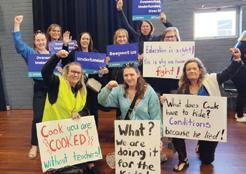
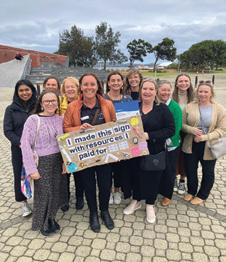
 Fitzroy Crossing
Broome
Meekatharra
Merredin
Katanning
Esperance
Albany Pinjarra
Fitzroy Crossing
Broome
Meekatharra
Merredin
Katanning
Esperance
Albany Pinjarra
Making your


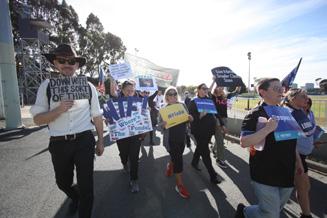
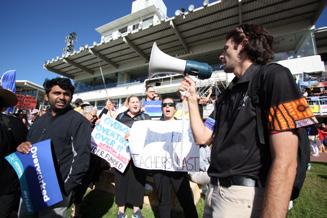




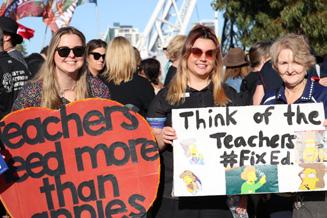
voice heard
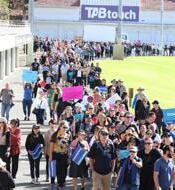






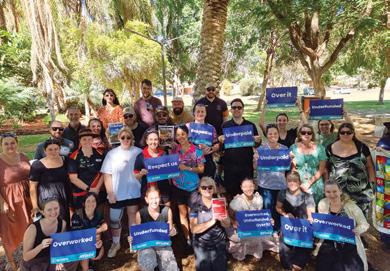


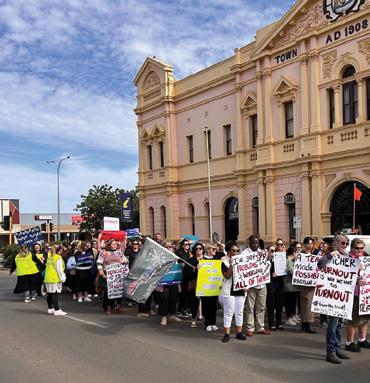
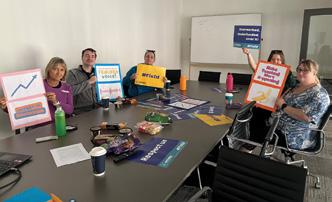





 Tom Price
Newman
Shark Bay
Kalgoorlie
Dalwallinu
Busselton
Bunbury
Gingin
Geraldton
Port Hedland
Karratha
Tom Price
Newman
Shark Bay
Kalgoorlie
Dalwallinu
Busselton
Bunbury
Gingin
Geraldton
Port Hedland
Karratha
National Reconciliation Week 2024
National Reconciliation Week (NRW) is a time for all Australians to learn about our shared histories, cultures, and achievements and to explore how each of us can contribute to achieving reconciliation in Australia.
The dates for NRW remain the same each year; 27 May to 3 June. These dates commemorate two significant milestones in the reconciliation journey— the successful 1967 referendum, and the High Court Mabo decision respectively.
Reconciliation must live in the hearts, minds and actions of all Australians as we move forward, creating a nation strengthened by respectful relationships between the wider Australian community, and Aboriginal and Torres Strait Islander peoples.
The theme for NRW 2024 is Now More Than Ever. It is a reminder that no matter what, the fight for justice and the rights of Aboriginal and Torres Strait Islander people will —and must —continue.
There have been many moments in Australia’s reconciliation journey that make us want to turn away. But when things are divisive, the worst thing we can do is disengage or disconnect.
Now more than ever, we need to tackle the unfinished business of reconciliation. We know that the 6.2 million Australians who voted yes last year in the Voice to Parliament referendum are committed to better outcomes for First Nations people and are with us.
Reconciliation supporters must stand up to defend and uphold the rights of First Nations peoples, to call out racism wherever encountered and to actively reinforce the voices of Aboriginal and Torres Strait Islander peoples across this continent.
Now more than ever, the work continues. In treaty making, in truth-telling, in understanding our history, in education, and in tackling racism. We need connection. We need respect. We need action. And we need change. Now more than ever, we need reconciliation.
The NRW 2024 design and artwork (seen opposite) represents the momentum of this year’s theme. The chevron, a universal symbol for pointing the way, signifies advancing as one as we look towards a reconciled future; and the vibrant artwork of Gubbi Gubbi artist Maggie Douglas encourages connecting with one another, understanding and continuing to move forward. The 2024 theme design incorporating the artwork is by social change creative agency Carbon Creative.


National Reconciliation Week started as the Week of Prayer for Reconciliation in 1993 (the International Year of the World’s Indigenous Peoples) and was supported by Australia’s major faith communities.
In 1996, the Council for Aboriginal Reconciliation launched Australia’s first National Reconciliation Week.
In 2001, Reconciliation Australia was established to continue to provide national leadership on reconciliation.
In the same year, approximately 300,000 people walked across Sydney Harbour Bridge as part of National Reconciliation


in cities and towns – to show their support for reconciliation.
Today, National Reconciliation Week is celebrated in workplaces, schools and early learning services, community organisations and groups, and by individuals Australia-wide.
We all have a role to play when it comes to reconciliation, and in playing our part we collectively build relationships and communities that value Aboriginal and Torres Strait Islander peoples, histories, cultures and futures.
Indigenous focus 21 Western Teacher May 2024
Having a good school culture and approach to gender
By Kellie Burns and Jessica Kean

Cranbrook in Sydney’s east is one of the most elite boys schools in Australia. In March, the ABC’s Four Corners program aired claims some female teachers had been bullied by male staff and sexually harassed by students.
Amid the school’s decision to go fully co-ed by 2028, there are concerns about whether Cranbrook will be a safe space for girls.
In a statement to the ABC, Cranbrook said its “current staff, including female staff, overwhelmingly support the School, its values and its culture”. It also said it has appointed teacher Daisy Turnbull to prepare for coeducation and “support the furtherance of gender equality” at the school.
What do schools need to do in order to be genuinely gender inclusive?
Sexist school cultures
In the last few years, a number of boys private schools have faced allegations of unacceptable gendered cultures. This includes sexual assault perpetrated by students, offensive behaviour online and in public and woefully inadequate responses to sexual assault and violence between students.
Previous Australian research has also found elite boys schools can be hostile places for women and girls, trans and gender diverse students, as well as boys who don’t conform to traditional norms of masculinity.
It’s not enough to simply go co-ed
Simply enrolling girls will not automatically make a boys school more inclusive, less sexist or safer.

Schools aiming to truly welcome a wider range of students will need to significantly reshape the structures and culture of the school itself, both within and beyond the classroom.
The World Health Organization has developed a framework to ensure schools are healthy and safe. It addresses three overlapping areas:
1. Teaching and learning.
2. The broader school environment.
3. Partnerships with parents and the community.
This approach can be applied to gender equity and inclusivity.
Teaching and learning
The first component of a healthy school involves what students learn and the approaches and strategies used to teach it.
Schools that are gender equitable provide diverse curricula and equally diverse extra-curricular opportunities accessible to all students, regardless of gender.
There are all kinds of boys and all kinds of girls. So even single sex schools should be catering to students with a wide range of skills, interests, preferences and experiences. Likewise, there are students who are trans and non-binary, who may be excluded from school activities divided along narrow gender lines.
Issues 22 Western Teacher May 2024

Some co-ed schools still segregate boys and girls for certain subjects. This approach upholds the idea that boys and girls learn differently and that some topics (such as menstruation) are too awkward to discuss in mixedgendered groups.
Some schools choose to segregate classrooms to improve girls’ opportunities in areas they have been traditionally underrepresented in. While this can spring from feminist recognition of gender inequalities, it reaffirms the very divides it is attempting to challenge.
Gender equity across the curriculum
The current Australian Curriculum provides opportunities to engage young people in discussions about gender stereotypes and power in ageappropriate ways, in both primary and high school.
In English, students should meet diverse characters that challenge traditional gender roles and inequality.
Science, technology, engineering and maths subjects can foster enthusiasm for STEM-related content and careers, through hands-on classroom activities that encourage critical thinking and build confidence.
In health and physical education, comprehensive sexualities and relationships education should be a priority and include discussions of gender, power, violence, consent and healthy relationships.
Teachers’ values and attitudes about gender will also be reflected in their everyday teaching routines and practices. This includes whether or not they address students through gendered language, divide students into gendered groups for activities or discipline boys and girls differently.
So, teachers also need support and quality professional development to keep pace with evolving understandings of gender and gender diversity.
The broader school environment
The second component of a healthy school is the school culture. School leaders should use respectful and inclusive language and there should be strong policies to deal with childprotection concerns, gender-based
discrimination and violence at school.
Research indicates that, unlike other forms of bullying, gender-based violence is often overlooked or ignored by staff. Sexist language and behaviours can be dismissed as “just a normal part of growing up” and so become a routine part of young people’s schooling experiences.

School staff should also feel valued, respected and safe in their workplace regardless of their sex, gender or sexuality. Unfortunately, evidence indicates this is not always the case. A 2018 survey found 43 per cent of NSW LGBTIQA teachers reported experiences of discrimination in the workplace. Australian research published in 2020 found women teachers were experiencing unacceptably high rates of sexual harassment in elite boys schools.
School leaders have a duty to ensure their schools have robust policies and processes for responding to disclosures of harassment and discrimination from staff. They also need to pursue evidenceinformed cultural change to ensure a safe work environment.
Involve students
Students can be active partners in developing an inclusive school community and can even help co-design curricula relating to gender, overcoming biases and developing healthy relationships.
Student diversity should also be reflected through gender-balanced representation in student leadership roles. Student initiatives around gender equality and LGBTQIA+ visibility, such as gender and sexuality alliances, should also be supported.
School uniforms should provide options so all young people feel safe and comfortable in what they wear at school.
Partnerships and services
The third and final part of a healthy school looks beyond the school gates. Schools should see parents as partners and celebrate diversity in the community.
Parents should be invited to ask questions about curriculum and school culture and to raise concerns or lend expertise. School policies should be publicly available and regularly reviewed with student and parent input.
Schools can also work with organisations that promote gender equity, diversity and promote healthy relationships such as Our Watch, Family Planning and Twenty10.
These organisations can support schools’ counselling and pastoral care services and provide resources and training for teachers.
All schools can adopt this model
While boys schools have been the focus of recent media attention all schools should be called upon to evaluate and reflect on their gendered culture.
Co-ed and girls schools are not immune to gender-based violence, sexism, homophobia and transphobia.
A whole-of-school review of curricula, school culture and partnerships can help schools ensure they are creating inclusive and respectful environments. This work is urgent if we aspire to a society where all students and teachers are safe in our schools.
Kellie Burns is a senior lecturer in health education at the University of Sydney. Jessica Kean is a lecturer in gender and cultural studies at the University of Sydney. The opinions expressed in this article are that of the author and do not necessarily reflect any official policies or positions of the AEU or SSTUWA. The article was first published on The Conversation website and has been reproduced here with permission.
Issues 23 Western Teacher May 2024
Positive impacts of increased public schools funding
By Trevor Cobbold Save our Schools Australia
At a time when the future funding of public schools is being determined by negotiations between the Commonwealth and state/territory governments, a groundbreaking new research paper shows that increasing funding for public schools has positive impacts on student achievement and attainment.
Higher school funding, especially for disadvantaged schools, increases student test scores, school completion, tertiary participation and improves equity in education. It also shows that capital funding has similar effects. The study shows that these effects are valid in a variety of circumstances and provide a reliable guide for policy makers.
The new research is published in the latest issue of the American Economic Journal: Applied Economics. Its lead author is Professor C. Kirabo Jackson of Northwestern University in Chicago, who was recently appointed to President Biden’s Council of Economic Advisors. Jackson is a leading scholar in what has become known as the “new literature” on school funding. A series of studies over the last 10 years has demonstrated that money matters in education because of its positive effects on student achievement and attainment.
Despite these positive findings they have been dismissed by some policy makers because the studies vary in time, policy context, populations and locations. This new study makes an a very significant contribution to the existing literature by attempting to overcome these limitations and give policy makers a more reliable guide about the impacts of school expenditure. As Jackson and his co-

author state: “We shed light on what range of policy impacts can be expected in a new context, and how marginal effects may differ by spending type, population, geography, and baseline spending levels.”
It is the first study ever to undertake such a project and its findings are highly significant for policy making in different settings.
The study conducted a meta-analysis of 31 studies that have established causal effects between school expenditure and student outcomes to explore the distribution of these effects. It estimates the average impact of a US$1,000 increase in per-student school spending

sustained over four years and the range of plausible impacts across settings.
The authors found that an increase in spending of US$1,000 per-student sustained over four years in an average setting would increases test scores by a small to moderate amount. They estimated that the impact would be positive 90 per cent of the time in different average settings.
The spending increase would increase high school graduation by two percentage points and tertiary education participation by 2.8 percentage points. There would be positive effects over 97 per cent of the time.
Issues 24 Western Teacher May 2024
The study also compared the size of the effect of the school spending increases with the impact of other educational polices.
It concluded that the school spending impact on test scores is equivalent to reducing class size by 1.8 students and that the impact on tertiary education participation is equivalent to reducing class size by between 10 and 7.3 students. The impacts are also similar to significant increases in teacher quality (0.26 and 3.4 standard deviations, respectively).
In benchmarking the effect of an increase in school spending against other policy interventions, the authors noted that the effect of school spending on completing high school and tertiary participation was twice as large as the effect on test scores. They said this suggests that just analysing the impact of school spending on test scores may understate the benefits of school spending.

participation by two percentage points among low-income groups about 90 per cent of the time, compared to less than 30 per cent of the time for higherincome groups.

As with many other studies, this study found significantly larger effects of increased school spending on achievement by low-income students than for economically advantaged students, especially for high school completion and tertiary participation.
It found that a US$1,000 increase in school spending would increase the test scores of low-income students by double that of high-income students. The impact on low-income students is small to moderate increase in test scores. The spending increase would improve test scores for low-income groups about 90 per cent of the time but just over 70 per cent of the time for non-lowincome groups.
The difference in impact between income groups is even more pronounced for education attainment as the impact on the educational attainment is more than three times as large for low-income students than for non low-income students.
Low-income students would see an increase 99 per cent of the time compared to 79 per cent of the time for non low-income students. The spending increase would increase tertiary
The study found similar impacts of the spending increase on students in both regional and urban city locations.
In another important new funding, the study also found no evidence of diminishing returns to school spending. It found similar effects on student achievement and attainment across a wide range of baseline spending levels. There is little evidence that the effects are smaller at higher levels of per student expenditure.
The evidence from previous studies on the impact of capital expenditure on student achievement is mixed. However, the authors of this study noted that most individual studies of capital spending are “under-powered” to detect the pooled effect which explains why the literature on capital spending appears mixed.
In contrast, they found that the average effects on test scores of a similar increase in capital spending are smaller than those of non capital-specific spending, but the difference was not statistically significant.
This is not just another “money matters” study that adds to over 30 studies during the last 15-20 years showing positive
effects of increases in school funding. It is a study co-authored by one of the leading education economists in the world.
It shows that money matters absolutely in a variety of circumstances. It matters in average settings, it matters in different locations, it matters at different funding levels and it matters whether it is recurrent or capital. Above all, it matters for low-income students, with effects three times that for higher income students.
It is a study that education ministers in Australia should closely consider in their negotiations over the next national school funding agreement. Low-income students in Australia are four to five years of learning behind their high income peers at age 15 and over 80 per cent of lowincome students attend public schools that are massively under-funded.
Better recurrent and capital funding of public schools will make a difference to the lives of many, not to mention increasing work force skills, productivity and general economic prosperity.
The opinions expressed in this article are that of the author and do not necessarily reflect any official policies or positions of the AEU or SSTUWA. The article was first published on the Save our Schools website and has been reproduced here with permission.
Issues 25 Western Teacher May 2024
National education and union news

Good news for NT public schools
The Australian Education Union (AEU) has welcomed news that the NT and federal governments are committing to full funding of public schools and said the investment was urgently needed.
AEU Federal President Correna Haythorpe said the current funding situation was shameful with NT public schools receiving the lowest proportion of Schooling Resource Standard (SRS) funding, despite having the highest levels of student need.
“This funding is long overdue and will change lives in the NT. The bulk of the funding must be delivered well before 2029 because we know that teachers and students need resources now,” she said.
“The Albanese Government’s commitment to provide 40 per cent of the SRS funding for the NT is a just recognition of its superior revenue raising capacity and its responsibility to ensure every child across the nation gets the support they need to succeed.
“The Prime Minister must also ensure
that the bilateral agreement signed this year removes the loophole in the current agreement that allows the NT to artificially inflate its SRS share by four per cent by including non-school costs such as capital depreciation.
“That Morrison-era loophole is denying NT public schools $40 million a year and Labor was clear in Opposition it would eliminate it from future agreements.
“Public schools need full not fake funding.”
AEU NT Branch President Michelle Ayres said full funding would make a huge difference across the NT.
“Funding NT schools at 100 per cent of the SRS means extra support for students with complex needs and those at risk of falling behind, more teachers, counsellors, support staff and Aboriginal and Torres Strait Islander education workers,” she said.
“We urgently need this investment to help every child in the NT succeed and we commend the NT and federal
governments for taking the lead to deliver full funding.”
Ms Haythorpe said the Albanese Government needed to now lift its funding offer to Tasmania, Queensland, Victoria, NSW and South Australia from 22.5 per cent of the SRS to 25 per cent to ensure they reach 100 per cent of the SRS by 2028, at the latest.
“Public schools also need federal government capital funding. Across the nation, private schools will get $1 billion in extra capital funding over four years but public schools will get nothing after this year unless the Prime Minister steps up,” she said.
Ms Haythorpe said an expert panel convened by education ministers in December reported that there was an “urgent and critical” need for full funding of public schools and it was the first step towards ensuring all students receive the support they need. The panel said full funding must be delivered across the country “within a comparable timeline”.
ACTU calls for increase to minimum wages
The ACTU announced it will seek a five per cent increase in Australia’s minimum and award wages as part of its submission to the Annual Wage Review.
Each year, the Fair Work Commission hears from unions, employers and governments before setting minimum and award wages for about 2.9 million, or one in four workers, which comes into

effect on 1 July 2024.
Workers on awards are about $5,200 worse off after inflation has eaten away at their pay rises over the past three years, despite recent positive increases in award wages. The ACTU claim would help workers meet current price rises and make up for the lost income over this period.
The ACTU submission argues that business can afford this fair and sensible increase, especially as levels of profits are well above pre-pandemic levels.
The claim would also have no negative impact on inflation, partly because the wages and hours of some of Australia’s lowest paid workers are modest. Indeed, last year was the biggest increase to the
26 Western Teacher May 2024 National education and union news
minimum wage in over 40 years, and inflation dropped by 3.7 per cent.
The increase would especially benefit women and part time workers, as three in five award workers are women and twothirds are part time.
A five per cent wage increase would lift the minimum hourly rate to $24.39 and the minimum annual full-time rate by $2,295 to take it to $48,200.
ACTU Secretary Sally McManus said: “The
lowest paid workers are the ones who are the hardest hit by inflation, they need a five per cent pay increase to start to get ahead again and make up for the real wage losses over the last few years.”
“When inflation goes up businesses are able to adjust their prices to protect their margins, but workers’ pay does not move so easily,” she said. “This is why the annual wage review is so important, it is when the lowest paid workers have the chance to catch up, the result makes an
enormous difference to millions of families.
“A five per cent pay increase is fair and reasonable. For some perspective, the CBA posted a $10 billion in profit last financial year. It could pay for the entire union wage claim for 2.9 million workers of five per cent and still be one of the most profitable businesses in the country.”
All workers should be protected from discrimination
The ACTU welcomes the Australian Law Reform Commission’s (ALRC) recommendation to protect students, teachers and other workers at religious educational institutions from discrimination.
The report on religious educational institutions and anti-discrimination laws was delivered to the Attorney-General in December after the government’s commitment to amending the Sex Discrimination Act 1984 and other federal anti-discrimination laws, including the Fair Work Act 2009
The report recommends removing exemptions in the Sex Discrimination Act, which permit religious schools to legally discriminate based on sexual orientation, gender identity, and marital or pregnancy status, and aligning the Fair Work Act to be consistent with these changes.
The ALRC was tasked with delivering
recommendations for an antidiscriminatory framework for religious educational institutions to ensure students and staff are not discriminated against, whilst also allowing these institutions to build a community of faith by giving preference, in good faith, to persons of the same religion as the educational institution in the selection of staff.
Importantly, the ALRC recommended that such preferencing should only be allowed where it is reasonably necessary to, and proportionate to the aim of, building or maintaining a community of faith, and where it would not be unlawful under the Sex Discrimination Act.
The report follows a consultation process with religious institutions, unions, legal experts, the education sector, and other organisations, with the aim of recommending legislative reforms that safeguard rights and freedoms in


international agreements Australia is a signatory to, including the International Covenant on Civil and Political Rights.
ACTU Assistant Secretary Liam O’Brien called for an end to the exemption that permitted religious educational institutions to discriminate against workers based on their sexuality, gender and relationship or pregnancy status.
“Unions believe that these reforms are necessary and should happen as a matter of urgency. All working people should be protected from discrimination, whether that is based on their gender, sexuality, religion, or any other attributes. People should be employed on their merit, and all forms of discrimination are unacceptable,” he said.
“Unions welcome further discussion with the government about the design of the recommendation’s provisions as well as future religious discrimination laws.”

27 Western Teacher May 2024 National education and union news 3 times National Finalists – Independent Financial Adviser (IFA) Excellence Awards – Best Client Servicing Company Let Marijana, Mei & the Team help you take control of your financial future We can help you: • Plan to start your family • Manage your cash flow • Own your own home sooner • Grow your wealth • Redundancy or inheritance • Transition to Retirement (TTR) • Plan for your retirement • Protect you and your family in the event of illness or death • Protect your income SPEAK TO A FINANCIAL ADVISER TODAY Members Special $1,200 OFF Statement of Advice Fee (08) 9322 1882 | lifefinancialplanners.com ABN 76 111 112 111 ASFL 296 182
Education & Training Centre
Online industrial training program for 2024
It’s not too late to join us online for some short, sharp and informative industrial training opportunities. During 2024 the SSTUWA staff have been offering a series of 45-minute Zoom events. These events provide a powerful forum for members to become more informed about important industrial topics. Join us in the second half of the year on selected Thursdays each term from 3.30-4.15pm.
The following two series are on offer:
• Series One: General Agreement 2023 (Schools)
Thursdays 3.30-4.15pm
This series provides live online learning opportunities for elected delegates around the proposed new 2023 General Agreement. This series will provide updates along the journey of the new agreement being finalised, including exploring Executive directives in relation to EBA negotiations as required. Once the agreement is endorsed the sessions will explore important new clauses that impact members the most.
Week 8: Thursday 6 June
Week 5: Thursday 15 August
Week 9: Thursday 12 September
Week 4: Thursday 31 October
•

Series Two: Workload - Hot Topics
Thursdays 3.30-4.15pm

This series of live online learning opportunities is designed for all interested members and elected delegates around hot topics and different aspects of workload. Whether the topic is an individual issue or something that is affecting multiple people in your school, these sessions will provide valuable support and resources to help solve workload issues. Make it work!
Week 3: Thursday 1 August
Week 7: Thursday 29 August
Week 2: Thursday 17 October
Workload Session Four: Compliance Tasks
Workload Session Five: Managing Oversized Class Sizes
Workload Session Six: TBC
“I really liked the mode and manner in which this was presented. It was easy to fit into my day.” Grovelands Primary School March 2024
“I liked the live chat allowing us to ask questions and then a dedicated time to answer them.” Quinns Beach Primary School March 2024
Education and Training Centre 28
Western Teacher May 2024
Live via Zoom

Professional learning opportunities
3-12 July
Live online professional events via Zoom
Leading Wellbeing - A Whole School Approach: Wednesday 3 July, 7.30-10.30am
Schools play an important role in developing the social and emotional competencies in students that contribute to student wellbeing. Leaders in schools also have a responsibility to support the wellbeing and the dignity of those people working in the school, leaders, teachers, administrators, support staff, and grounds and maintenance staff. Finding the common ground between wellbeing for staff and students can reduce workload and increase the effectiveness of wellbeing approaches. This three-hour course will support leaders of wellbeing to develop practical, effective and sustainable approaches to wellbeing.
Steps to Reconciliation: Friday 5 July, 8-10am
Teachers have a professional responsibility under AITSL standard 2.4.2 to promote reconciliation with Aboriginal and Torres Strait Islander people. As teachers we have a unique opportunity to advance reconciliation in what we teach and how we teach about Aboriginal and Torres Strait Islander histories and cultures. The presenter will explore the issues and outline the teaching resources available for the classroom.
Decolonising the Curriculum: Friday 5 July, 11am-2pm
This session will explore the education systems and societal assumptions that underpin the approach to curriculum formation. It is an important starting point to ensure that we engage authentically with First Nations perspectives throughout the curriculum. The presenter will build on the ideas that they presented in their article in the TLN Journal - Steps to Reconciliation (email training@sstuwa.org.au for a copy).

Middle Leadership - Improving Literacy Outcomes (Secondary Focus): Tuesday 9 July, 7.30-10.30am
It is the responsibility of all teachers in the secondary years to promote improved literacy outcomes to assist students to succeed in their career and life ambitions. In this leadership session, the presenter will work through approaches to promote literacy across the curriculum, including building essential vocabulary, explicit teaching to master complex writing tasks and developing the capacity to read the required texts in any subject.
Middle Leadership - Creating Positive Parent Relationships: Thursday 11 July, 11.30am-2.30pm
Healthy relationships lead to increased parent involvement in the child’s education and supportive relationships with teachers. In this session, the presenter, who has researched extensively in this field, will outline a guiding framework for middle leaders in engaging parents. The session will set out successful practical strategies that the presenter has implemented in their school.
Differentiation
for Students with a Learning Disability: Friday 12 July, 8am-1pm
In this session, one of Australia’s leading teachers working with students with learning disabilities, Belinda Webb, will outline approaches to self-regulation and sensory processing, behavioural issues and knowledge acquisition, experienced by those students with learning disability. There will be a focus on ASD and ADHD. It is a practical, classroom-focused course.

Education and Training Centre 29 Western Teacher May 2024 Live via Zoom
Member benefits
Accountants and Financial Advisers
Aston Accountants
10% discount on personal income tax returns for members.
sstuwa.org.au/aston
Industry Fund Services
Specialist financial products for union members.
sstuwa.org.au/ifs
LIFE Financial Planners
$1,200 off your statement of advice fee plus a free financial health check for members.
sstuwa.org.au/lifefinancial
TIPS Financial Services
$1,100 discount on your TIPS Transition to Retirement strategy or Retirement plan. Exclusive to members. sstuwa.org.au/tipsfs
Banking
ME Bank
Special offers throughout the year for members. A bank built by, and for, union members.
sstuwa.org.au/mebank
Mortgages, Money and Me
Complimentary advice, property reports, finance tools and more for SSTUWA members.
sstuwa.org.au/mmme
OFX Money Transfers
When it matters, OFX it. Save with the experts in international money transfers.
sstuwa.org.au/ofx
Teachers Mutual Bank
Banking exclusively for the education community.
sstuwa.org.au/tmbank
Massive discounts on products and services for SSTUWA members
Cars
AutoBahn
Mechanical and electrical services.
Members receive 10% off any AutoBahn service or repair, capped at $100. sstuwa.org.au/autobahn
Bayswater Mazda
Exclusive offer including fuel card, servicing and more.
sstuwa.org.au/bayswatermazda
Bob Jane T-Marts
National fleet pricing on a range of products and services. sstuwa.org.au/bobjane
easifleet
$250 Magic Hand Carwash voucher with any easifleet procured novated lease. sstuwa.org.au/easifleet
Europcar
10% discount on vehicle hire in Australia. sstuwa.org.au/europcar
Fleet Network
Package your next car and save on tax. Bonus gift with vehicle delivery. sstuwa.org.au/fleetnetwork
Motor Market by Union Shopper
You choose the car, then we find you the lowest price. sstuwa.org.au/motormarket
Western Motor Vehicle
Consultants
We’ll find a car you’ll love. Save time and money when sourcing your next vehicle. sstuwa.org.au/westernmotors
Computers
Altronics
Build it yourself electronics centre. VIP trade discount in store and online. sstuwa.org.au/altronics
Apple on Campus
For details visit: sstuwa.org.au/apple
Dell
Save up to 5% off selected items. sstuwa.org.au/dell

HP Computers
Huge savings for members on laptops, accessories, printers and more. sstuwa.org.au/hp
PLE Computers
Save on your IT with access to the PLE Computers academic portal. sstuwa.org.au/ple
The Good Guys Commercial
Online access to live discounted pricing on The Good Guys’ range. sstuwa.org.au/thegoodguys
Educational Resources
Classroom Management
A Thinking and Caring Approach. By Barrie Bennett and Peter Smilanich. sstuwa.org.au/classroommgmt
Effective Group Work
Beyond Cooperative Learning. By Barrie Bennett. sstuwa.org.au/effectivegroupwork
Graphic Intelligence
Possibilities for Assessment and Instruction. By Barrie Bennett. sstuwa.org.au/graphicintelligence
Instructional Intelligence
Building Instructional Expertise for the Classroom. An SSTUWA project in collaboration with Barrie Bennett. sstuwa.org.au/instructionalintelligence
Teacher Superstore
5-10% discount, in store and online. sstuwa.org.au/teachersuperstore
Entertainment
Movie tickets
Discounts on physical tickets (greater savings) and instant digital tickets. sstuwa.org.au/movietickets
Outback Splash
Featuring both water and year-round attractions. Discounted tickets for members. sstuwa.org.au/outbacksplash
Rockface
Indoor rock climbing in Balcatta. $15 all day climbing pass with harness hire. sstuwa.org.au/rockface
30 Western Teacher May 2024
Member Benefits

For more information visit sstuwa.org.au/benefits and the benefits tab of the SSTUWA App
Food and Wine
Campbells
Access wholesale prices with a complimentary day pass. sstuwa.org.au/campbells
Cellar d’Or
Best value winery tour in the Margaret River Region. 10% discount for members. sstuwa.org.au/cellardor
Taste Bud Tours
Swan Valley “Speed Grazing” – 20% discount. Good Food, Wine & Cider (am) or Good Food, Wine & Beer (pm). sstuwa.org.au/tastebudtours
Health and Wellbeing
St John
First aid saves lives. Discounted first aid courses and kits for members. sstuwa.org.au/stjohn
WA Opticians
20% discount on spectacle frames and lenses. Perth and East Perth. sstuwa.org.au/waopticians
Housing
Houspect
Buy, build and invest with confidence. $50 discount on prepurchase building inspections. sstuwa.org.au/houspect
Johns Building Supplies
Trade prices on paint and painters’ hardware. Builders prices on all other hardware lines. sstuwa.org.au/jbs
SkylightsWA
Specialising in skylights and roof ventilation, servicing all regions of WA. 7% discount off selected products. sstuwa.org.au/skylightswa
Wattyl
15% off Wattyl paints, stains and accessories at Wattyl Paint Centres in WA.
sstuwa.org.au/wattyl

Insurance and Legal
Journey Cover insurance
For details visit: sstuwa.org.au/journeycover
SSTUWA Legal Services
Access to quality legal services for both work-related and personal matters. sstuwa.org.au/legal
Teachers Health Fund
Join the thousands of teachers who have already made the switch. sstuwa.org.au/teachershealth
Teachers Health – Travel
For details visit: sstuwa.org.au/travelinsurance
Wills for members
Members can access a complimentary simple will, where appropriate. For more information or details about a complex will, visit: sstuwa.org.au/wills
Shopping
Dot Mall
BBQs, heaters and backyard kitchens. 5% discount for members. sstuwa.org.au/dotmall
Electrical buying
Let Union Shopper find the best deal on your electrical purchases. sstuwa.org.au/electricalbuying
isubscribe
Up to an extra 10% off any print and digital magazine subscription; over 4,000 titles. sstuwa.org.au/isubscribe
Jackson’s Drawing Supplies
10% discount in Jackson’s 12 shops and online.
sstuwa.org.au/jacksons
Petals Flowers & Gifts
20% off flowers and gifts. World-wide delivery available. sstuwa.org.au/petals
Teacher Superstore
5-10% discount, in store and online. sstuwa.org.au/teachersuperstore
The Good Guys Commercial
Online access to live discounted pricing on The Good Guys’ full range. sstuwa.org.au/thegoodguys
Travel and Accommodation
Accor Hotels
Great savings for teachers at Accor Hotels in the Asia Pacific region. sstuwa.org.au/accorhotels
Choice Hotels
Choice Hotels welcomes SSTUWA members with exclusive rates at locations in Australia and NZ. sstuwa.org.au/choicehotels
Experience Oz
Save 10% on over 3,000 experiences across Oz + NZ. sstuwa.org.au/experienceoz
Inn the Tuarts Guest Lodge
Forest retreat, 4-star, with indoor pool, Jacuzzi, sauna and BBQ. Adults (12 years+) only. Five minutes to Busselton. Studios and rooms. 22.5% off rack rate or best available rate. sstuwa.org.au/innthetuarts
Jarrah Grove Forest Retreat
Luxurious, self-contained accommodation in Margaret River. Discounted rates for members. sstuwa.org.au/jarrahgrove
Mandurah Houseboats
10% discount on houseboat holidays. sstuwa.org.au/houseboats
Metro Hotel Perth City
15% discount on the best available rate. Located in East Perth near the WACA and Gloucester Park. sstuwa.org.au/metroperth
Rottnest ferry tickets
Save up to $15 on Rottnest ferry tickets with WestClub. sstuwa.org.au/rottnest
31 Western Teacher May 2024
*Terms & conditions apply. Please visit our website for full details. Member Benefits
Classifieds
Block for sale: Jurien Bay
700sqm fully serviced, ready to build on, one block back from beach. Close to schools, town centre, marina and recreational water activities. Perfect holiday, retiree or sea-change locale. $108,000 (negotiable).
Peter: 0437 377 361 | westside@tower.net.au
Augusta
3x1 spacious holiday rental. One double, one queen, five singles. 200m from the river and town. Magnificent river views. One large living area, three sided veranda and BBQ. Provide own linen and towels. $150 per night plus $50 cleaning fee. gregrowl@iinet.net.au
Dunsborough (Quindalup)
Large 4x2 holiday home on Geographe Bay Rd. Swimming beach 30m away. Free use of private boat mooring. Room to park boats with boat ramp a minute away. Slow combustion wood heater and reverse-cycle air-con. Available all year except for leavers’ vacation. No pets. 0419 943 203 a_r_moore@bigpond.com
Dwellingup
Après Huit and Dwell Cottage provide luxury self-contained accommodation set in beautifully landscaped gardens. Can be rented separately or together. Après Huit: 2x2, main house. Dwell Cottage: 1x1, furnished in a French theme. Robert: 0419 954 079 dwellcottage.com.au
Dwellingup
In need of a tree change? Time out to reconnect with nature? Time for a vacation in Dwellingup’s Jarrah forest, 90 minutes from Perth. Chuditch Holiday Home is perfect for couples, groups and families. It’s centrally located and sleeps up to eight people.
Shani: 0402 615 235 shanivore@hotmail.com
Floreat
Studio B&B. New, stylish single room. Fridge, kitchenette, TV, aircon in lovely peaceful Floreat house and garden. Linen, tea/coffee, continental/cooked breakfast ingredients supplied. Suit mature person wishing to enjoy quiet accommodation. Close to city, buses, shops, hospitals and beaches. $85 per night, min two nights. Weekly and monthly rates available. SMS: 0422 333 057
Frankland River
Private secluded retreat. Choose from three different types of separate accommodation. Three bedroom homestead: two king beds, two single beds – sleeps six (no pets). Two adults $195/night, children under 13 $25/night, extra adult guests $50/night. One bedroom chalet: one queen bed – sleeps

two. $139/night, adults only. One bedroom cabin: one queen bed – sleeps two. $169/night, adults only. franklandriver.com.au
Jade: 0430 450 093 |
Sam: 0413 160 093
Fremantle
Short term accommodation in central Fremantle. Recently refurbished with all conveniences for modern living. Townhouse has three queen-sized bedrooms plus provision for two singles. Enjoy time in the rear garden, complete with BBQ. Secure parking for two cars, access controlled by electric gates. 9430 4458 | 0407 083 174 info@westerley.com.au
Fremantle
Staycation? Attending a function? Cosmopolitan getaway? Fremantle is the place. Cafes, restaurants and breweries. Markets, beach, art galleries, museums, theatre, events, shopping, skate park, Ferris wheel, whale watching... What more could you want? Eco-Gallery Apartment is stylish, centrally located, sleeps three and has secure parking. (08) 6323 2339 admin@smartstaywa.com.au
Kallaroo
Serenity Escape is a 2x1 apartment with full kitchen, offering comfort and convenience. 20 min walk to beach, 5 min drive to train station, walking distance to Whitfords Brewing Co, cinema and shops. Toiletries, slippers and coffee machine provided. Min two nights. Sleeps four, or five with mattress. No pets. $125/night for 3 people; $10/night per extra person. Molly: 0428 166 559 mollysletters@gmail.com
Kalbarri
Clean, tidy, self-contained family-friendly 3x1 brick house at the top end of a quiet cul-de-sac. Sleeps eight: two x queen beds and two x bunk beds. Close to Blue Holes Beach, 15 min walk to town. kalbarriwa.net.au | 0435 845 504

Lancelin
Large 5x2 holiday home. Everything within walking distance, close to beaches and town centre. Sleeps 14. Large wrap around verandah with outdoor seating/eating and bbq. Heaps of parking for boats or quads. $45/night/person (min six). Min two nights. SMS: 0412 804 345
Margaret River
Two bedrooms, private, comfortable, fully equipped stone cottage with fireplace, located amongst the forest opposite Boranup National Park, 17km south of Margaret River on Caves Road. Close to beaches, wineries, caves and galleries. $150 per night for two people, or provide own linen and towels for $120 per night. Russell: 0418 933 270
Nannup
Seraphim Retreat is a pet friendly 3x1 character farm cottage, five minutes from friendly Nannup. Set in acreage, with established gardens and stunning valley views. Air conditioned and wood heater. Horse riders can bring their horses to access our arena and trails. Teacher discount: $159 weekends, $149 midweek. See website for details. seraphimretreatnannup.com SMS 0420 832 510
Safety Bay
Very clean and tidy, traditional style 3x1 duplex in Safety Bay. Fully furnished and equipped. One street from beach. Presently a minimum stay requirement (this may change).
cnjn@aapt.net.au
Trigg
Self contained accommodation. Kitchen, laundry, queen sized bed plus fold out double couch in lounge. Free WiFi and Netflix. Own entrance. Find us on Facebook.
Kerry: 0409 884 330 | FB: @justriggin 67justriggin@gmail.com
Email 50 words or fewer to editor@sstuwa.org.au along with your union membership number. Free for members.
32
Western Teacher May 2024 Classifieds
Classifieds
Yallingup
Rammed earth cottage, 2x1, nestled amongst bushland. Well located, short walk to Studio Gallery Bistro, two-minute drive to Caves House. Beaches, galleries, wineries and restaurants close by. Sleeps six. No dogs. stayz.com.au (property 136151)
Kirsty: 0419 927 660
Tranquillity Counselling, Psychotherapy and Career Development
I provide holistic, confidential practical counselling to help you deal with an array of issues, some being: general relationship, mental health, anger issues/management, anxiety, depression, self-harm, grief and trauma, addiction, abuse, palliative care. Milica Robinson, MCnsig&Psychthpy, GradCertCareerDev, BEd. 0422 358 187
Retirement coach
Are you recently retired or retiring soon? You probably have a financial plan in place but developing a plan for the non-financial side of retirement can be as important as preparing financially. I offer support and guidance for the transition from work to retirement, helping you to find purpose and meaning in retirement. Contact me to arrange an obligation free chat. retirementcoaching01@gmail.com
Marriage celebrant
Marriage celebrant with 12 years of experience, working in the Peel, South West and Perth areas. Specialising in creating personalised ceremonies for couples at their chosen wedding location. I’d love to help you plan your special day!
Meridith: 0400 312 535 meri.lake4@gmail.com
Marriage celebrant
Heart Centered Ceremonies for couples wanting a personalised wedding. Lee will help you design your dream wedding – a memorable occasion. Mention this ad to receive a discount.
Lee: 0404 655 567 leehalligancelebrant.com.au

Marriage celebrant
Experienced professional celebrant available, all areas. Formal or informal, large or small weddings. A Beautiful Ceremony will help you design an unforgettable and uniquely personal ceremony.
Mary: 0418 906 391 maryburke40@hotmail.com
Funeral celebrant
I am an experienced funeral celebrant. It will be my honour to assist you in the cocreation and presentation of a ceremony that serves to honour your loved one, by revealing their essence through a uniquely constructed and presented combination of spoken word, rituals, symbols, audio and visual displays.
0449 075 001
Kc.fcelebrant@gmail.com
Learn to social dance
Learn jive, waltz, rumba, samba, tango and other dances for social events (ball, wedding, cruise, etc). A fun and easy course with quality instruction. Join with or without a partner. Melville (LeisureFit) Recreation Centre. Mondays 7.30-9pm. $118/8 weeks. Beginners’ course held every term. Term 3 starts 22 July. Stan: 9330 6737 | stan@stansdancing.com
First aid training for students
St John Ambulance WA offers free first aid training to all school aged students, ranging from Triple 000 Hero for Kindergarten students to Road Trauma First Aid for secondary school students. Courses are curriculum mapped. (08) 9334 1259 youth@stjohnambulance.com.au
Free dairy excursions
Brownes Dairy invites your classroom to join a free curriculum-linked tour of the dairy in Balcatta. Students from Kindergarten to Year 6 get a unique hands-on experience and see how our dairy operates and produces award
winning dairy products enjoyed in WA for 130 years. school.tours@brownesdairy.com.au
Road safety education for schools
RAC offers free curriculum aligned road safety workshops and online resources for primary schools (pre-primary to Year 6) and secondary schools (Years 10 to 12), covering a range of road safety topics designed to keep young people safe on and around the roads. (08) 9436 4471 | rac.com.au/education communityeducation@rac.com.au
MAWA
The Mathematical Association of Western Australia offers professional learning opportunities, conferences and consultancy services to teachers and schools and networks. MAWA members receive 10 per cent discount on MAWA shop resources. For more information: mawainc.org.au 9345 0388 | eo@mawainc.org.au
Macramé is the new yoga
I'm a teacher running small group macramé classes in a cosy home studio. Join me and discover the power of mindfulness as you learn to engage your mind and your hands in a fun supportive environment. It's a powerful way to calm a busy mind.
marcia@knotinlove.com.au
Rainbow Reading
Are you running support groups for ESL, special needs or reading? Do you tutor adolescents or adult reading? Using proven techniques we enhance results. Our innovative reading pen assists with learning, while motivating the hard-toengage student. Available for all our books.
rainbowreading.com.au
Di: 0407 490 253

33
Western Teacher May 2024 Classifieds
Retired teachers
The next meeting of the Retired Teachers’ Association is Wednesday 19 June at the SSTUWA premises from 10am. All retired members are welcome.
Video conferencing facilities are available for those who cannot attend in person. Email contact@sstuwa.org.au for the link.
Stay in touch: Join the RTA Facebook Group – search “Retired Teachers’ Association of the SSTUWA”.
World Day Against Child Labour
Held each year on 12 June, this day is a focal point of the International Labour Organisations’ push to end child labour worldwide. The day brings together governments, employers and workers organisations, civil society, as well as millions of people from around the world to highlight the plight of child labourers and what can be done to help them. For more information visit bit.ly/48RAQtO or bit.ly/49OhKG9
State Council Conference
June 2024 State Council Conference will be held on 14-15 June. The deadline for agenda items was 19 April.
November 2024 State Council Conference will be held on 15-16 November. Agenda items must be received by 20 September.
Refugee Week: 16-22 June
Refugee Week is Australia’s peak annual activity to inform the public about refugees and celebrate positive contributions made by refugees to Australian society. World Refugee Day is celebrated during this period, on 20 June. The 2024 theme for Refugee Week is Finding Freedom: Family. Australia has a once-ina-lifetime opportunity to hit the reset button on how we behave towards one another and emerge a more fulfilled and connected society. For more information visit refugeeweek.org.au
Level 3 Classroom Teachers’ Association: 2024 meeting dates
Term 3
Thurs 5 Sept
SSTUWA and online, 4.30pm

Term 4
AGM: Sat 30 Nov Online, 10.30am
Venue: SSTUWA, 1 West St, West Perth and/or online via Zoom More info: www.l3cta.org.au | contact@l3cta.org.au
SSTUWA committee meeting dates: Venue: SSTUWA office | Contact: (08) 9210 6000 or contact@sstuwa.org.au
New Educators Committee
Time: 4pm 18 June 13 August 3 December
Women’s Committee
2024 dates TBC
Videoconference facilities are available
LGBTIQ+ Committee
2024 dates TBC
Aboriginal and Torres Strait Islander Committee
2024 dates TBC
TAFE Committee
2024 dates TBC
Email to editor@sstuwa.org.au
Noticeboard
34
Western Teacher May 2024 Noticeboard
Early Childhood Educators Committee 2024 dates TBC School Leaders Committee 2024 dates TBC




35 Western Teacher May 2024 Know Your Rights, tax statement, membership card and more Introducing the SSTUWA super app Get the app

•

Transition to Retirement Specialists Financial solutions and advice to help you transition Phone (08) 6465 5400 | Visit www.tipsfs.com.au Yenbase Pty Ltd trading as TIPS Financial Services is an authorised representative of TIPS Polaris Pty Ltd AFSL 542326 Are you reducing hours in 2024 or thinking of retiring? TIPS specialise in helping people 50+ plan ahead What you will need to consider
Can I afford to reduce my hours?
How much do I need to comfortably retire on?
How can I maximise my income & reduce tax?
When is it best to pay off my mortgage? TIPS Financial Services helping WA Education Staff & their families for over 35 years Talk to your TIPS Financial & Lifestyle Specialists today TTR and Tax benefits will continue in 2024 & beyond! Please see tipsfs.com.au
•
•
•





































 Fitzroy Crossing
Broome
Meekatharra
Merredin
Katanning
Esperance
Albany Pinjarra
Fitzroy Crossing
Broome
Meekatharra
Merredin
Katanning
Esperance
Albany Pinjarra


























 Tom Price
Newman
Shark Bay
Kalgoorlie
Dalwallinu
Busselton
Bunbury
Gingin
Geraldton
Port Hedland
Karratha
Tom Price
Newman
Shark Bay
Kalgoorlie
Dalwallinu
Busselton
Bunbury
Gingin
Geraldton
Port Hedland
Karratha




















